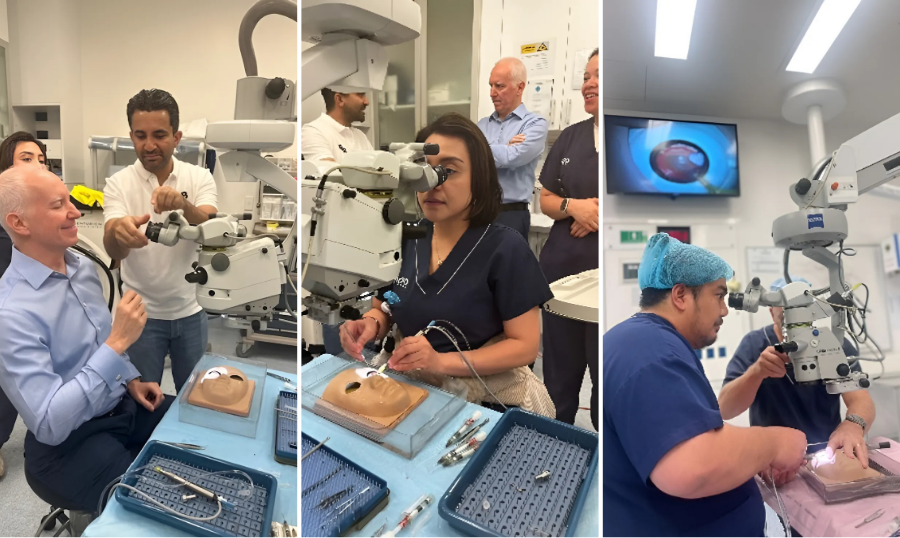Auckland Eye sets new standard in digital accessibility with website toolbar launch
Discover how Auckland Eye is redefining inclusive healthcare by launching New Zealand’s first assistive website toolbar.

A key indicator of cataract development is clouding or blurring of the vision that cannot be corrected with glasses. That, coupled with “night halos” or glare, sensitivity to light, double vision in a single eye, difficulty driving and reading or colours appearing less sharp/vivid may be an indication of a cataract. However, the best way to know for sure if you are developing cataracts is by scheduling a consultation with one of our eye specialists. They will run a series of tests to properly assess your eyes and diagnose the cause of your poor vision.
Cataracts can be diagnosed by an optometrist or an ophthalmologist by performing a series of tests, usually included in a comprehensive eye examination. The following tests help eye specialists diagnose cataracts and determine their severity.
Visual Acuity
A visual acuity test uses an eye chart to measure how well you can read a series of letters. Your eyes are tested one at a time, while the other eye is covered. Using a chart or a viewing device with progressively smaller letters, your eye doctor determines if you have 20/20 vision or if your vision shows signs of impairment.
Slit Lamp Examination
A slit lamp allows your eye doctor to view the structures at the front of your eye under magnification. The microscope is called a slit lamp because it uses an intense line of light, a slit, to illuminate your cornea, iris and lens, and the space between your iris and cornea. By looking through the slit lamp, the doctor can examine the lens to detect any abnormalities and determine the degree to which the lens is clouded due to cataract.
Pupil Dilation
To prepare for a pupil dilation exam, your eye doctor will put drops in your eyes to open your pupils wide. This makes it easier to examine the back of your eyes (retina). Since the clouding of the lens is not noticeable until a cataract reaches an advanced stage, dilating the pupil (causing an increase in pupil size) enables the ophthalmologist to view your entire lens. By thoroughly examining the lens, your doctor can determine whether or not a cataract is affecting your quality of vision.
Contrast Sensitivity
Contrast sensitivity testing is similar to visual acuity testing but places greater emphasis on how cataracts can decrease image contrast due to light scattering and glare caused by the cataract. By measuring your ability to distinguish between finer increments of light versus dark (contrast), contrast sensitivity testing is sometimes a useful measure of visual function, especially in situations of low light, fog or glare, when the contrast between objects and their background often is reduced.
Cataracts cannot be fixed with glasses, contact lenses or laser eye surgery — the only effective treatment for cataracts is lens replacement surgery. Lens replacement surgery involves removing the clouded lens and replacing it with a clear artificial lens. The artificial lens, called an intraocular lens (IOL), is positioned in the same place as your natural lens and it remains a permanent part of your eye. When you decide to have lens replacement surgery, your ophthalmologist will talk with you about IOLs, how they work and which IOL treatment option will provide you with the best visual outcome possible.
Before the Surgery
Your ophthalmologist will measure your eye to set the proper focusing power for your IOL. Also, you will be asked about any medicines you take.
You may be prescribed eyedrop medicines to start before surgery. These medicines help prevent infection and reduce swelling during and after surgery. There will also be drops to use afterwards.
The Day of Surgery
After Your Surgery
After the procedure, you may experience some mild discomfort for a few days. While the recovery period can vary from person to person, in general, most patients report clear vision the day after after cataract surgery. However, it is important to remember that each person heals differently and you may need as long as a week or two before you see images in their sharpest focus. Depending on the focal point of the lens you have chosen you may need to update your glasses a month or so after surgery before the vision is perfect. After about a week or two, you can go back to doing all the things you enjoy (now with great vision!)
Things to remember after surgery:
Cataract removal is one of the most common eye operations performed in New Zealand today. It is also one of the safest and most effective and is successful in over 98% of cases. Due to advancements in technology, the results of modern lens replacement surgery are more predictable, there are few side effects and the eye usually makes a full recovery within only a few weeks.
The ophthalmologists at Auckland Eye use the latest and most sophisticated techniques and equipment to ensure the best results for your lens replacement surgery. If you have a question about cataract surgery or would like to book an appointment, please contact our friendly specialist team on 0800 AKL EYES or email to admin@aucklandeye.co.nz.

Discover how Auckland Eye is redefining inclusive healthcare by launching New Zealand’s first assistive website toolbar.

Macular degeneration is a leading cause of vision loss in older adults. There’s no cure, but its progression can be slowed. Here’s what to know.

Auckland Eye hosted an extraordinary Continued Medical Education (CME) day titled “Walk in Our Surgeons’ Shoes (Socks)”.